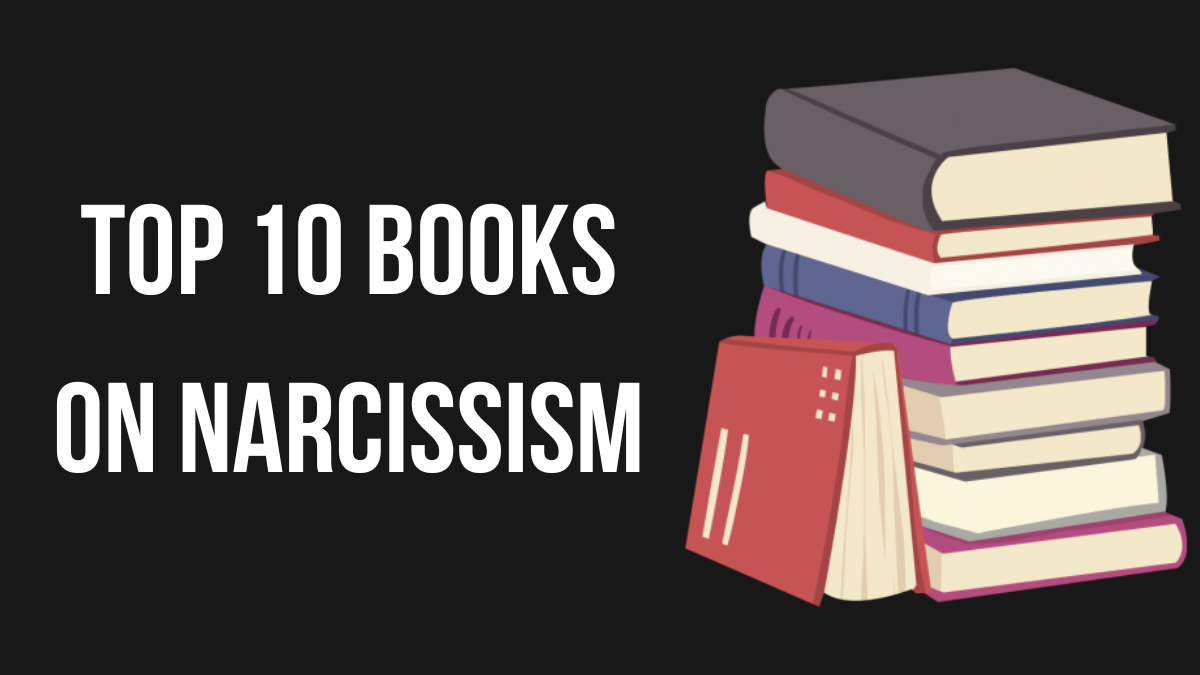If you’re seeking knowledge on Narcissism and Narcissistic abuse, books on this topic can be an invaluable resource. In this article, I’ll be sharing with you my top picks for the 10 best books on narcissism that can provide valuable insights and understanding.
Narcissism is a personality disorder that is characterized by excessive self-love, lack of empathy, and a need for admiration. Living or dealing with a narcissist can be a challenging and emotionally draining experience. That’s why it’s important to educate ourselves on this topic to better understand the behavior and learn how to cope with it.
One of the best ways to do so is by reading books on narcissism. In this blog post, we’ve compiled a list of the top 10 books on narcissism that cover a wide range of topics such as narcissistic abuse, healing from a relationship with a narcissist, and understanding the different types of narcissists.
Whether you’re dealing with a narcissist in your personal life or simply want to learn more about this complex personality disorder, these books are an excellent place to start.
List of 10 books best books on Narcissism:
1.The Narcissistic Family: Diagnosis and Treatment-Narcissism Book
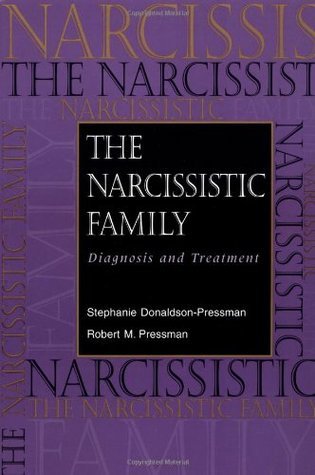
“The Narcissistic Family: Diagnosis and Treatment” by Stephanie Donaldson-Pressman and Robert Pressman is a book that delves into the effects of narcissistic parents on their children and the family dynamic as a whole.
The book provides a comprehensive analysis of the narcissistic family system and offers a framework for diagnosis and treatment. The authors explore the various roles family members play within the system, such as the golden child, the scapegoat, and the lost child. They also provide practical guidance for therapists working with individuals who grew up in a narcissistic family, and offer hope for healing and recovery.
This book is a valuable resource for anyone seeking to understand the impact of narcissism on the family, and the steps needed to break free from its damaging effects.
2. Disarming the Narcissist: Surviving and Thriving with the Self-Absorbed
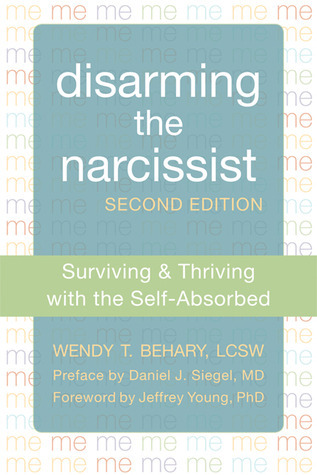
“Disarming the Narcissist: Surviving and Thriving with the Self-Absorbed” by Wendy T. Behary is a practical guide for dealing with narcissistic individuals in personal and professional relationships. The book provides insight into the mind of a narcissist, and offers strategies for disarming their defense mechanisms and managing their behavior.
The author outlines different types of narcissistic behavior, such as the grandiose narcissist, the covert narcissist, and the malignant narcissist. She explains how these different types of narcissists behave in relationships and the impact their behavior has on those around them. Behary also provides tools and techniques for communicating effectively with narcissists, setting boundaries, and protecting oneself from their toxic behavior.
One of the key takeaways from the book is the concept of empathic confrontation, which involves confronting the narcissist in a way that acknowledges their perspective while also holding them accountable for their behavior. Behary emphasizes the importance of taking care of oneself while dealing with narcissists, and offers guidance for building resilience and coping with the emotional toll of these relationships.
Overall, “Disarming the Narcissist” is a valuable resource for anyone dealing with narcissistic individuals in their personal or professional life. It offers practical strategies for managing these relationships while also providing insight into the mindset of a narcissist.
3. The Wizard of Oz and Other Narcissists: Coping with the One-Way Relationship in Work, Love, and Family
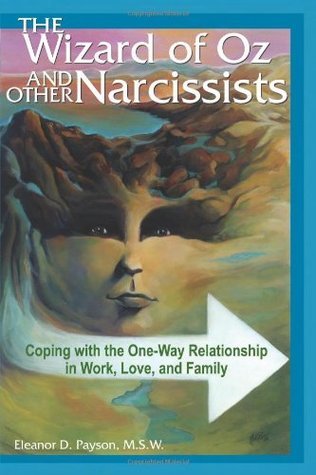
“The Wizard of Oz and Other Narcissists: Coping with the One-Way Relationship in Work, Love, and Family” by Eleanor D. Payson is a book that provides insights into the dynamics of narcissistic relationships and how they can impact different aspects of life. Here are 10 important takeaways from the book:
- Narcissists lack empathy and are only concerned with their own needs and desires. They are unable to truly understand or empathize with the feelings of others.
- Codependents are often attracted to narcissists due to their desire to fix or rescue them. However, this dynamic can be unhealthy and lead to a cycle of one-way relationships.
- Narcissists may use manipulative tactics, such as gaslighting, to control and maintain power over their partners or family members.
- Narcissists may engage in love bombing in the beginning of a relationship to gain control over their partner.
- The author uses characters from “The Wizard of Oz” to provide insights into different types of narcissistic behavior, such as the Cowardly Lion representing a narcissist who lacks confidence and constantly seeks validation from others.
- It is important to set boundaries in relationships with narcissists, as they may push boundaries and disregard the needs and feelings of others.
- It is crucial to prioritize self-care and self-love in relationships with narcissists, as they may drain the energy and emotional resources of their partners.
- Children who grow up in households with narcissistic parents may develop their own codependent tendencies and struggle with setting boundaries in relationships later in life.
- It is important to seek professional help and support when dealing with a narcissistic partner or family member.
- Recovery from narcissistic abuse can be a long and difficult process, but it is possible with the right tools and support.
Overall, “The Wizard of Oz and Other Narcissists” provides valuable insights into the dynamics of narcissistic relationships and how they can impact various aspects of life. It emphasizes the importance of self-care, setting boundaries, and seeking support when dealing with a narcissistic partner or family member.
4. Why Is It Always About You? The Seven Deadly Sins of Narcissism
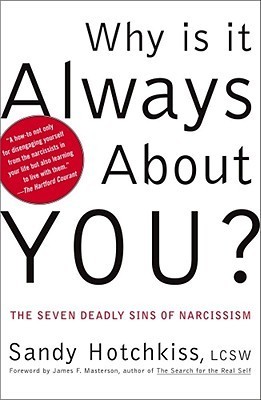
“Why Is It Always About You? The Seven Deadly Sins of Narcissism” by Sandy Hotchkiss is a comprehensive book that delves into the intricacies of narcissism. Here are ten important takeaways from the book:
- Narcissism is a personality disorder characterized by an excessive focus on oneself, grandiosity, and a lack of empathy.
- The seven deadly sins of narcissism are: shamelessness, magical thinking, arrogance, envy, entitlement, exploitation, and bad boundaries.
- Narcissists have a fragile self-esteem and are prone to feelings of shame and humiliation, which they try to avoid at all costs.
- Narcissists often engage in manipulation and gaslighting to control and manipulate others.
- Narcissistic parents can have a profound impact on their children’s emotional and psychological well-being.
- Codependency is a common dynamic in relationships with narcissists, with the codependent partner often sacrificing their own needs and desires to meet the narcissist’s demands.
- Recovery from narcissistic abuse involves developing a strong sense of self, setting healthy boundaries, and learning to trust one’s own feelings and perceptions.
- Narcissistic personality disorder is difficult to treat, as many narcissists lack insight into their own behavior and are resistant to therapy.
- Narcissism can manifest in different ways, including grandiose narcissism, vulnerable narcissism, and malignant narcissism.
- It’s important to recognize the signs of narcissism and set boundaries to protect oneself from being exploited or manipulated.
In summary, “Why Is It Always About You? The Seven Deadly Sins of Narcissism” provides a detailed and insightful exploration of narcissism and its impact on individuals, relationships, and society.
The book offers valuable guidance for individuals who have experienced narcissistic abuse, as well as for mental health professionals seeking to better understand and treat narcissistic personality disorder.
By identifying the seven deadly sins of narcissism and offering practical strategies for coping with narcissistic behavior, this book is a valuable resource for anyone seeking to navigate the complexities of this personality disorder.
5. Malignant Self-Love: Narcissism Revisited-Narcissism books
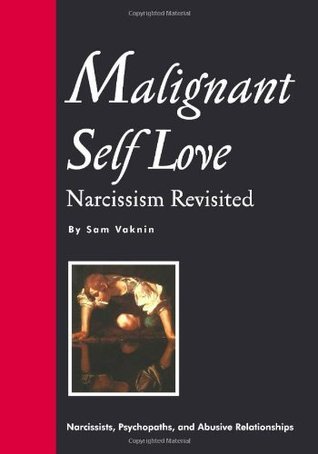
“Malignant Self-Love: Narcissism Revisited” by Sam Vaknin is a comprehensive and in-depth exploration of the phenomenon of narcissism. Sam Vaknin is himself a self-proclaimed narcissist, and his personal experience and knowledge shine through in this book. Here are five important takeaways and a brief summary of the book:
- Narcissism is a spectrum disorder: According to Vaknin, narcissism exists on a spectrum, with healthy narcissism on one end and pathological narcissism on the other. He explores the different levels of narcissism, including the more severe form of the disorder known as Narcissistic Personality Disorder (NPD).
- The origins of narcissism: Vaknin argues that narcissism is often the result of childhood trauma and abuse, particularly emotional neglect or abandonment. He also suggests that genetics and neurobiology may play a role in the development of the disorder.
- The narcissistic personality: Vaknin outlines the various traits and characteristics of the narcissistic personality, including grandiosity, lack of empathy, and a sense of entitlement. He also explores the different subtypes of narcissism, including somatic, cerebral, and malignant narcissism.
- The impact of narcissism on relationships: The book explores the ways in which narcissism can negatively impact romantic relationships, family dynamics, and work relationships. Vaknin argues that the narcissist’s need for constant validation and attention often leads to a one-sided and toxic dynamic.
- Healing from narcissism: Vaknin offers guidance for both narcissists and their loved ones on how to heal from the disorder. He emphasizes the importance of therapy, self-awareness, and personal responsibility in the healing process.
Overall, “Malignant Self-Love” is a dense and informative book that delves deeply into the complex nature of narcissism. Vaknin’s personal experience and insights provide a unique perspective on the disorder, and the book offers valuable guidance for both narcissists and those affected by their behavior.
6. The Covert Passive-Aggressive Narcissist: Recognizing the Traits and Finding Healing After Hidden Emotional and Psychological Abuse
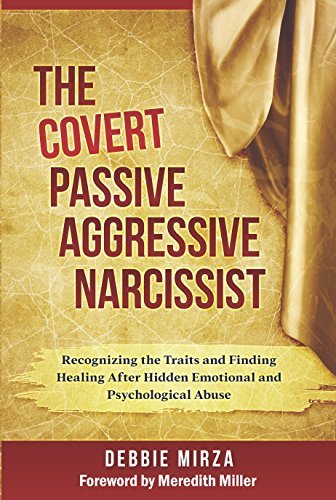
“The Covert Passive-Aggressive Narcissist: Recognizing the Traits and Finding Healing After Hidden Emotional and Psychological Abuse” is a book written by Debbie Mirza that focuses on identifying and understanding the behavior of covert passive-aggressive narcissists. The book provides a comprehensive guide to identifying covert narcissistic traits and how to deal with their toxic behavior.
Here are 5 important takeaways from the book:
- Understanding the behavior of covert passive-aggressive narcissists: The book provides insight into how these individuals operate, what drives their behavior, and how to recognize them in your life.
- Identifying and setting boundaries: The author emphasizes the importance of setting boundaries when dealing with covert narcissists. By setting clear boundaries and sticking to them, you can protect yourself from their toxic behavior.
- Learning to detach: One of the key strategies for dealing with covert narcissists is learning to detach emotionally. This means not taking their behavior personally and not letting them affect your emotions.
- Healing from the effects of covert narcissistic abuse: The book provides practical strategies for healing from the emotional and psychological abuse that often comes with being in a relationship with a covert narcissist.
- Moving on: Finally, the book provides advice on how to move on from a relationship with a covert narcissist. This includes recognizing your own worth and finding ways to rebuild your life and move forward in a positive direction.
7. Narcissism: Denial of the True Self
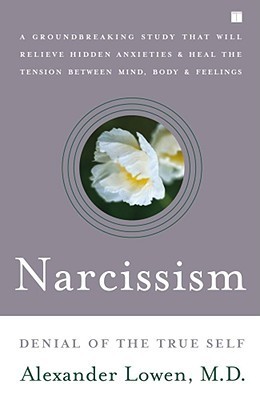
“Narcissism: Denial of the True Self” by Alexander Lowen explores the topic of narcissism and how it can impact an individual’s life. Lowen discusses how narcissism develops and the different ways it can manifest, including grandiosity, self-absorption, and entitlement.
He also delves into the psychological and emotional effects of narcissism, such as the inability to form meaningful relationships and the fear of vulnerability. Lowen offers insights into how individuals can begin to recognize and address narcissistic tendencies to ultimately connect with their true selves.
Five Important Takeaways:
- Narcissism is a defense mechanism that develops in response to early childhood experiences of neglect or abuse.
- Narcissists often have a distorted self-image and struggle to connect with their true emotions and needs.
- The behavior of narcissists is often rooted in a deep sense of shame and fear of vulnerability.
- Healing from narcissistic tendencies involves acknowledging and working through the underlying emotional wounds and trauma.
- It is possible for individuals with narcissistic tendencies to develop greater self-awareness and empathy, leading to more fulfilling relationships and a stronger sense of self.
8. The Narcissism Epidemic: Living in the Age of Entitlement
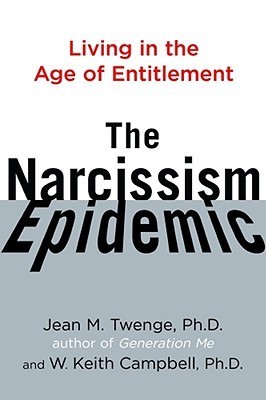
“The Narcissism Epidemic: Living in the Age of Entitlement” is a thought-provoking book by Jean M. Twenge and W. Keith Campbell. The book offers an in-depth analysis of the growing phenomenon of narcissism and entitlement in society today. The authors explain how narcissism has become an epidemic in modern culture and explore the causes and consequences of this trend.
The book presents a compelling argument that narcissism is not only an individual issue but a societal problem that affects our politics, economics, and social relationships. The authors provide a wealth of research evidence, case studies, and personal anecdotes to illustrate the damaging effects of narcissism on individuals and society as a whole.
Important takeaways:
- Narcissism is on the rise: According to the book, narcissism has increased significantly in the past few decades, with rates of narcissistic personality disorder doubling in the last 10 years.
- The cultural factors that fuel narcissism: The book discusses the cultural factors that contribute to the rise of narcissism, such as social media, celebrity culture, and the emphasis on self-promotion and self-esteem.
- The impact of narcissism on relationships: The book explores the impact of narcissism on relationships, including friendships, romantic relationships, and family dynamics.
- The connection between narcissism and entitlement: The authors argue that narcissism and entitlement are closely linked, as entitlement is a key characteristic of narcissistic individuals.
- The need for greater empathy: The book highlights the importance of cultivating empathy and compassion to counteract the harmful effects of narcissism in society. The authors call for a cultural shift towards greater empathy and compassion, which they believe will lead to a healthier, more connected society.
9. The Sociopath Next Door

“The Sociopath Next Door” by Martha Stout is a book that delves into the world of sociopaths and their behavior. The author describes sociopaths as individuals who lack empathy, are manipulative, and have no moral compass. These individuals can be found in various settings, such as in the workplace, relationships, and even in families.
Here are 5 important takeaways from the book:
- Sociopaths can be charming and persuasive: Sociopaths are skilled at manipulation and can use their charm to get what they want. They can be very convincing and persuasive, often making others believe in their lies.
- They lack empathy: One of the defining traits of sociopaths is their inability to feel empathy. They have no regard for others’ feelings, and are unable to put themselves in someone else’s shoes.
- They are pathological liars: Sociopaths lie easily and frequently. They often lie to manipulate others or to hide their true intentions.
- They are impulsive and irresponsible: Sociopaths often have trouble controlling their impulses, leading to risky behavior and irresponsible actions. They may also struggle with addiction or substance abuse.
- They can be dangerous: While not all sociopaths are violent, some can be dangerous to those around them. They may engage in criminal behavior, or become physically or emotionally abusive towards others.
In conclusion, “The Sociopath Next Door” provides insight into the world of sociopaths and their behavior. The book serves as a warning to individuals who may come into contact with sociopaths, and provides guidance on how to recognize and protect oneself from their harmful behavior.
10. The Human Magnet Syndrome: The Codependent Narcissist Trap
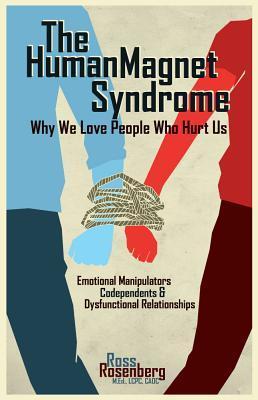
“The Human Magnet Syndrome: The Codependent Narcissist Trap” by Ross Rosenberg is a guidebook for individuals struggling with codependency and narcissism in their relationships. The author uses the term “human magnet syndrome” to describe the dynamic in which codependents are drawn to narcissists and vice versa. This book offers insights into how this pattern develops, how it can be recognized, and how to break free from it.
Takeaways:
- The human magnet syndrome is a common dynamic in relationships where one person is codependent and the other is a narcissist.
- Codependents and narcissists are drawn to each other because of their childhood wounds and unresolved emotional issues.
- Codependents often have low self-esteem and rely on others for their sense of self-worth, while narcissists have an inflated sense of self and need constant admiration and attention from others.
- Breaking the cycle of codependency and narcissism requires both individuals to work on themselves and address their underlying emotional issues.
- Healing from codependency and narcissism involves learning to set boundaries, developing self-care practices, and building healthy relationships based on mutual respect and trust.
Overall, “The Human Magnet Syndrome” provides valuable insights into the complex dynamics of codependency and narcissism in relationships, and offers practical advice for breaking free from this destructive pattern.
Last words
In conclusion, these 10 books provide valuable insights and practical tools for understanding and coping with narcissism, whether you are dealing with a narcissistic partner, parent, friend, or coworker. They offer hope and healing for those who have suffered from narcissistic abuse, and help readers to cultivate healthy boundaries, self-care, and self-compassion.
Whether you are looking to deepen your knowledge of narcissism or seeking guidance on your personal healing journey, these books are essential resources for anyone who wants to move from surviving to thriving.
